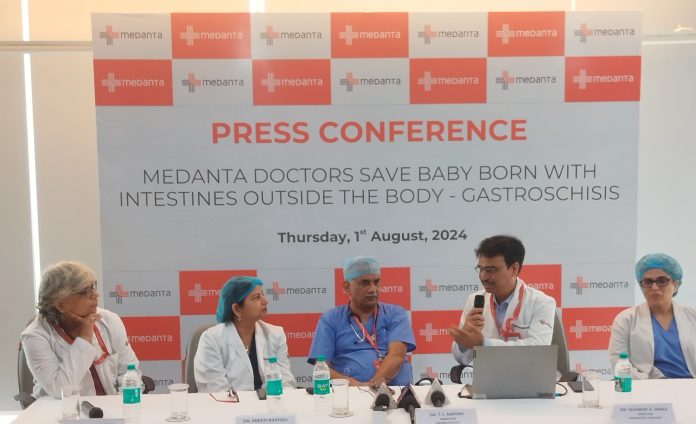Gurugram, 1st August 2024 : A newborn baby girl was recently treated at Medanta for an uncommon congenital condition, called Gastroschisis. In this condition, the baby is born with intestines protruding outside the body through a hole in the abdominal wall near the umbilical cord. This can be life-threatening if not corrected surgically immediately after birth. Punjab-based Mrs. Sakshi Shukla was alerted of the congenital defect in the foetus during the Level-2 scan, done at 18-20 weeks of pregnancy, following which she came to Medanta Gurugram and settled here for treatment given the high-risk pregnancy. Supported by Medanta’s advanced infrastructure, a multidisciplinary team of doctors, led by Dr. Shandip Kumar Sinha (Director, Paediatric Surgery), Dr Preeti Rastogi (Director, Obstetrics and Gynaecology) and Dr T J Antony (Director, Neonatology), worked together seamlessly to save the baby.
Dr Preeti Rastogi, Director, Obstetrics and Gynaecology said, “When the patient came to us at 26 weeks, we first ruled out any associated developmental problems as associated soft tissue and developmental anomalies can throw up challenges. We recommended close follow-ups to ensure the foetus was not at risk of intrauterine growth restriction (IUGR) or premature delivery. In Gastroschisis, it is crucial that the baby is born at term because prematurity adds additional risks and complications to an already difficult situation. At 37 weeks, since our patient was beginning to show early signs of severe oligohydramnios (decreased amniotic fluid) and there was decreased foetal movement, we took her up for elective caesarean section. Although IUGR had set in, the baby weighed 2.3kg at birth and had fully developed organs, making the surgery safer.”
Dr T J Antony, Director, Neonatology said, “The neonatal team was present at birth to ensure she started breathing effectively and normally. Simultaneously, the surgical team worked to ensure the intestines did not dry out and covered them properly in a polythene wrap to keep them moist, and protected from germs and contaminants. They also ensured there were no blockages or mal rotation. Then we wheeled the baby into the neonatal intensive care unit (NICU), where she was stabilised, her initial workup was done, and after two hours she was ready for surgery.”
Dr Shandip Kumar Sinha, Director, Paediatric Surgery said, “Operating on a newborn within the first few hours of life is complex due to the body’s transitional changes. Both expertise and advanced facilities are essential for such delicate procedures. We had to ensure that the intestine was placed back correctly into the abdomen, a task that required precision. Creating the necessary space without making it too tight was critical to maintaining viability. In this child, after emptying the meconium (the first stool of an infant) and mobilising the delicate skin flap, we were able to create space for intestine to be placed inside abdominal cavity. Our anaesthetist maintained a closed watch over the child during the surgery. We made sure that the closure was not associated with compartment syndrome. The entire surgery took 1 hour 30 minutes and there were no post operative complications.”
After the surgery, the baby was brought back to the NICU, and ventilated for 48 hours. She started accepting gastric feeds on Day 5 of life. Till then she was fed intravenously a mixture of amino acids, fats, carbohydrates and electrolytes (total parenteral nutrition). “We gradually increased the feedings. We ensured the baby tolerated the feeds, didn’t pick up any infections, and continued to gain weight. After 12 days, the baby was ready to go home with her mother,” added Dr Antony.

